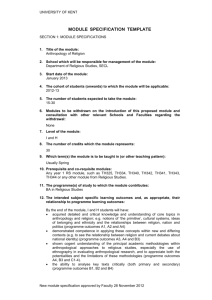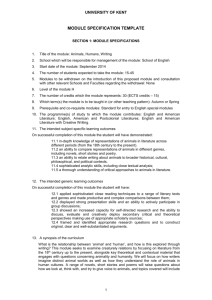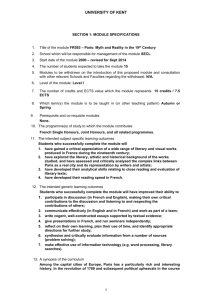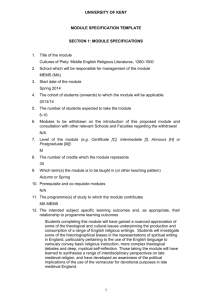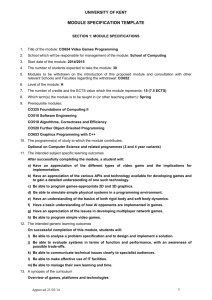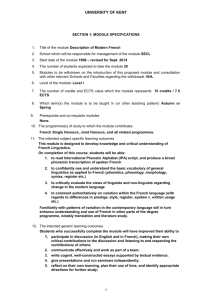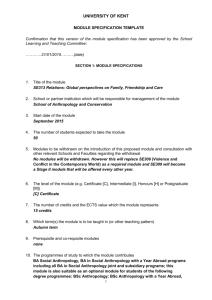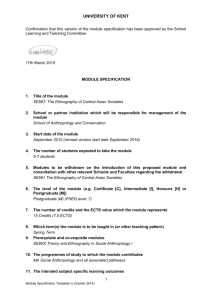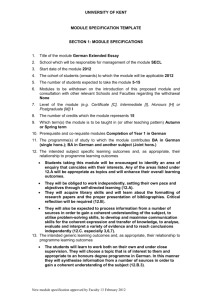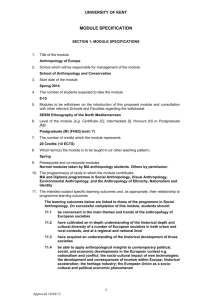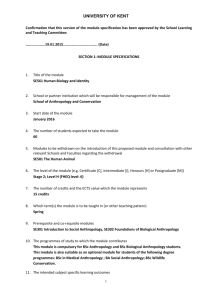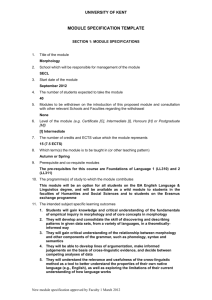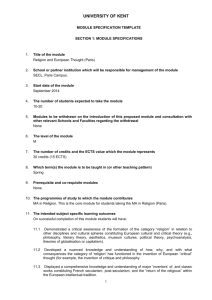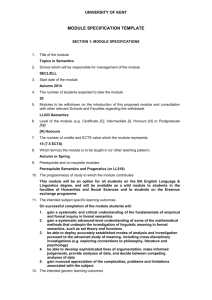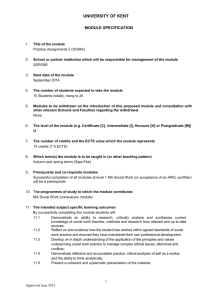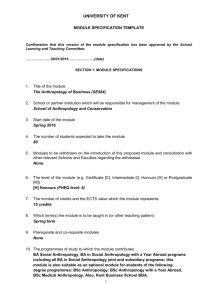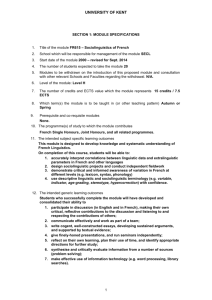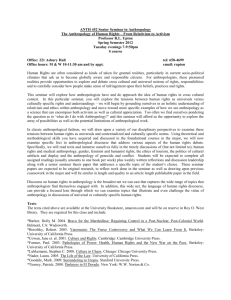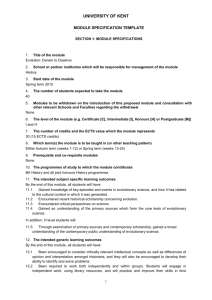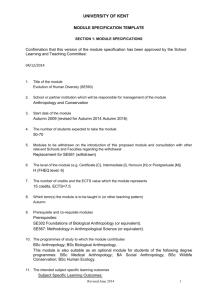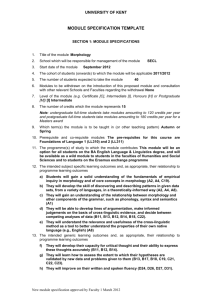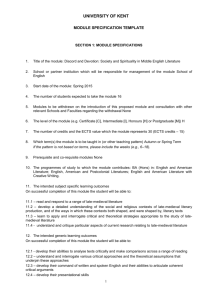TH620/TH621 - University of Kent
advertisement
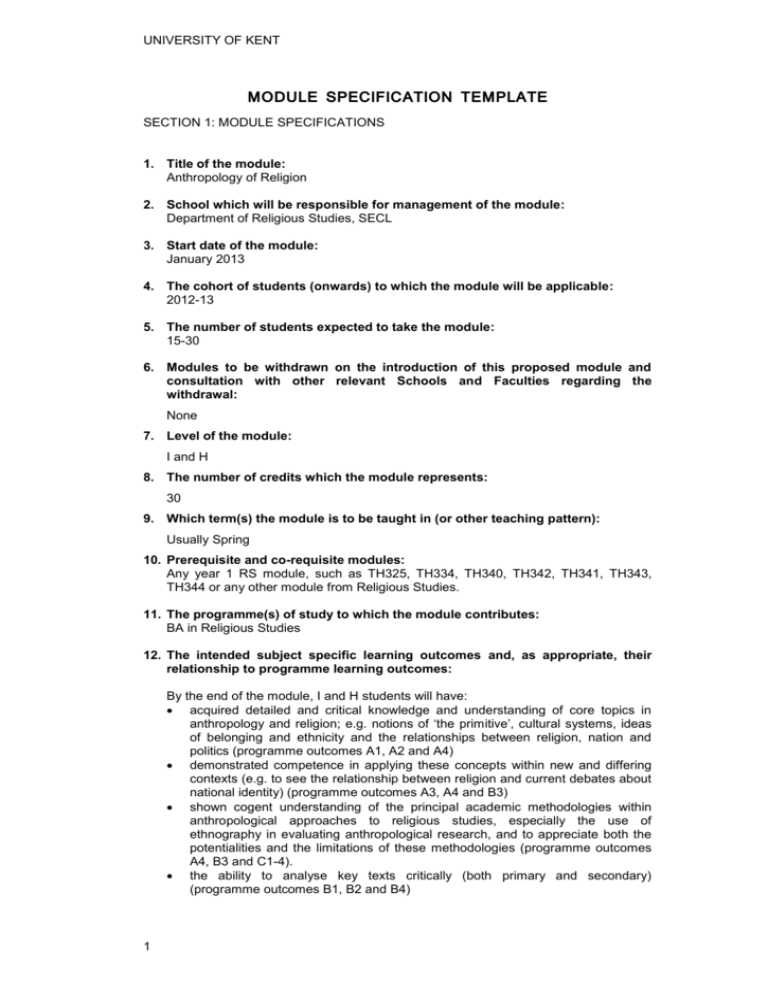
UNIVERSITY OF KENT MODULE SPECIFICATION TEMPLATE SECTION 1: MODULE SPECIFICATIONS 1. Title of the module: Anthropology of Religion 2. School which will be responsible for management of the module: Department of Religious Studies, SECL 3. Start date of the module: January 2013 4. The cohort of students (onwards) to which the module will be applicable: 2012-13 5. The number of students expected to take the module: 15-30 6. Modules to be withdrawn on the introduction of this proposed module and consultation with other relevant Schools and Faculties regarding the withdrawal: None 7. Level of the module: I and H 8. The number of credits which the module represents: 30 9. Which term(s) the module is to be taught in (or other teaching pattern): Usually Spring 10. Prerequisite and co-requisite modules: Any year 1 RS module, such as TH325, TH334, TH340, TH342, TH341, TH343, TH344 or any other module from Religious Studies. 11. The programme(s) of study to which the module contributes: BA in Religious Studies 12. The intended subject specific learning outcomes and, as appropriate, their relationship to programme learning outcomes: By the end of the module, I and H students will have: acquired detailed and critical knowledge and understanding of core topics in anthropology and religion; e.g. notions of ‘the primitive’, cultural systems, ideas of belonging and ethnicity and the relationships between religion, nation and politics (programme outcomes A1, A2 and A4) demonstrated competence in applying these concepts within new and differing contexts (e.g. to see the relationship between religion and current debates about national identity) (programme outcomes A3, A4 and B3) shown cogent understanding of the principal academic methodologies within anthropological approaches to religious studies, especially the use of ethnography in evaluating anthropological research, and to appreciate both the potentialities and the limitations of these methodologies (programme outcomes A4, B3 and C1-4). the ability to analyse key texts critically (both primary and secondary) (programme outcomes B1, B2 and B4) 1 UNIVERSITY OF KENT In addition, at the end of the module H-level students will have: carried out and displayed understanding of additional research and critical thinking in both written assessments and seminar topics that shows an appreciation of the uncertainty, ambiguity and limits of knowledge (programme outcomes B1-4) thorough, detailed and systematic knowledge of core tenets of the subject, including a comprehensive appreciation of the latest research on anthropological approaches to the study of religion (e.g. Falzon’s (2009) concept of multi-sited ethnography) (programme outcomes A1-4) the necessary skills in using contemporary research methodologies, analytical technique and other modes of enquiry currently at the cutting edge of anthropological and religious studies (e.g. empirical studies of the impacts of migration) (programme outcomes A4, B2 and B3) demonstrated independent learning skills by being able to make use of a wide range of high-level resources, including up-to-date research in peer-reviewed journals, information technology, relevant subject bibliographies and other primary and secondary sources (programme outcomes C1-4) the ability to analyse key texts and other materials critically at a high level (programme outcomes B3 and B4) 13. The intended generic learning outcomes and, as appropriate, their relationship to programme learning outcomes: By the end of the module, I and H students will have: developed analytical and comparative skills (programme outcomes C1, C2 and C4) enhanced their oral skills through class presentations (programme outcome D3) learned key analytic skills by applying phenomenological, hermeneutic and genealogical methods (programme outcomes A1-4, B2 and B3) developed writing and organizing skills through two coursework assessments (programme outcomes B2 and D1–D5). In addition, H level students will be able to: demonstrate the acquisition of an independent learning style when engaging with the course content, for example in the preparation and presentation of course work, in carrying out independent research, in compiling bibliographies and other lists of research materials, by showing the ability to reflect on their own learning and by mediating complex arguments in both oral and written form (programme outcomes D3, D4 and D6) analyse, discuss, deconstruct and demonstrate cogent understanding of central texts and their associated exegesis and, subsequently, assemble and present arguments based on this analysis; by virtue of this process, students will also gain an appreciation of the uncertainty and ambiguity which surrounds the core themes of this module (programme outcomes B2, C1 and C2) approach problem solving creatively, and form critical and evaluative judgments about the appropriateness of these approaches (programme outcomes B4, D1 and D6) present the outcomes of the research and learning in a form appreciable by both specialist and non-specialist audiences in a variety of settings and conexts (programme outcome D3) The module will activate the following key skills: 2 Communication: students learn to give oral presentations and extract essential information from them (through writing workshops and through individual presentations of their own and others’ work); analyse and respond to a text; organize ideas and express them in a logical and convincing manner (orally and UNIVERSITY OF KENT in writing); account for and justify methodological choices; create and thrive in a mutually-supportive group environment (teamwork) (programme outcome D1 and D3) IT: students will enhance their IT skills by conducting individual research using available resources (library and online) and by using computers to produce their portfolios and critical essay; the module will also be delivered via Moodle, giving further practice in IT skills (programme outcome D2) Working with others: in seminars and workshops, students will work together in groups both to discuss and solve methodological/stylistic problems and to present the outcomes of these discussions to other members of the class. These sessions develop students’ ability to work together confidently and productively (programme outcome D3) Professional development: on completion of the module, students will have developed the learning ability needed to undertake appropriate further training of a professional or equivalent nature (programme outcome D6) 14. A synopsis of the curriculum: The aim of the course is to provide students with an understanding of the history and practice of the anthropology of religion through the past 150 years as well as an historical and contemporary understanding of how anthropological studies of religion enrich knowledge of what it means to be religious. The course will examine and students will practice the anthropological method of rich participant observation and comparative analysis. Course content focuses on foundational and contemporary issues of religious definition, ritual, belief, embodiment, rationality and relationships in both Western and non-western contexts. 15. Indicative Reading List: Bowie, F. 2006. The anthropology of religion. Oxford: Blackwell. Cohen, A. P. 1982 . Belonging: identity and social organization in British rural cultures. Manchester: Manchester University Press. Day, A. 2011 Believing in Belonging: Belief and Social Identity in the Modern World. Oxford: Oxford University Press. Hammersley, M. and P. Atkinson 1995. Ethnography: principles in practice. London: Routledge. Lambeck, M. (ed.) 2002. A reader in the anthropology of religion. Malden, Mass.: Blackwell. Luhrmann, T. M. 2007. University Press. Persuasions of the witch’s craft. Cambridge: Harvard 16. Learning and Teaching Methods, including the nature and number of contact hours and the total study hours which will be expected of students, and how these relate to achievement of the intended learning outcomes: One weekly one-hour lecture and one weekly two-hour seminar/workshop (not same day). The lecture will summarise key points on the week’s theme, draw attention to critical and comparative issues and suggest further readings. The seminar/workshop will consist of a one-hour student-led discussion on the week’s reading and reflections on the lecture, followed by a one-hour workshop to test out key ideas through small group discussion and practical exercises. 3 UNIVERSITY OF KENT The module will be taught on the basis of a lecture and seminar (33 class contact hours). Allowing for preparatory reading for seminars and independent work for the essays, the total study hours will be 300 hours. 17. Assessment methods and how these relate to testing achievement of the intended learning outcomes Assessment will be through an essay, examination and seminar performance. These will help students develop expected knowledge outcomes and requisite generic skills of independent study and critical examination. Level I: 1500-word essay (30%), 1500-word coursework report on practical ethnographic exercises (20%), 2-hour examination (30%). seminar performance (20%) Level H: 2500-word essay (25%), 2000-word coursework report on practical ethnographic exercises (25%), 2-hour examination (30%). seminar performance (10%), 1000 word book review (10%) In order to differentiate between the two levels at which the module is operating, level H students will be expected to show a wider research ability and demonstrate a stronger critical analysis of the material than their counterparts at level I. H students will demonstrate their wider research skills and additional critical insights with longer essays and an additional book review. I and H level students will have to choose their essay questions from different sets of questions and there will be separate exam papers for I and H level students. Students at level H will also write longer essays. 18. Implications for learning resources, including staff, library, IT and space There are no implications for learning resources as this module has been taught since January 2005 and all of the books are in the library. 19. The School recognises and has embedded the expectations of current disability equality legislation, and supports students with a declared disability or special educational need in its teaching. Within this module we will make reasonable adjustments wherever necessary, including additional or substitute materials, teaching modes or assessment methods for students who have declared and discussed their learning support needs. Arrangements for students with declared disabilities will be made on an individual basis, in consultation with the University’s disability/dyslexia support service, and specialist support will be provided where needed. 20. Campus(es) where module will be delivered: Canterbury If the module is part of a programme in a Partner College or Validated Institution, please complete the following: 21. Partner College/Validated Institution 22. University School (for cognate programmes) or Faculty (for non-cognate programmes) responsible for the programme 4 UNIVERSITY OF KENT SECTION 2: MODULE IS PART OF A PROGRAMME OF STUDY IN A UNIVERSITY SCHOOL Statement by the School Director of Learning and Teaching/School Director of Graduate Studies (as appropriate): "I confirm I have been consulted on the above module proposal and have given advice on the correct procedures and required content of module proposals" ................................................................ .............................................. Director of Learning and Teaching/Director of Graduate Studies (delete as applicable) Date ………………………………………………… Print Name Statement by the Head of School: "I confirm that the School has approved the introduction of the module and, where the module is proposed by School staff, will be responsible for its resourcing" ................................................................. .............................................. Head of School Date ……………………………………………………. Print Name SECTION 3: MODULE IS PART OF A PROGRAMME IN A PARTNER COLLEGE OR VALIDATED INSTITUTION (Where the module is proposed by a Partner College/Validated Institution) Statement by the Nominated Officer of the College/Validated Institution (delete as applicable): "I confirm that the College/Validated Institution (delete as applicable) has approved the introduction of the module and will be responsible for its resourcing" ................................................................. Nominated Responsible Officer College/Validated Institution of .............................................. Partner …………………………………………………. Print Name 5 Date UNIVERSITY OF KENT ………………………………………………….. Post …………………………………………. Partner College/Validated Institution Module Last updated November 2011 6 Specification Template
